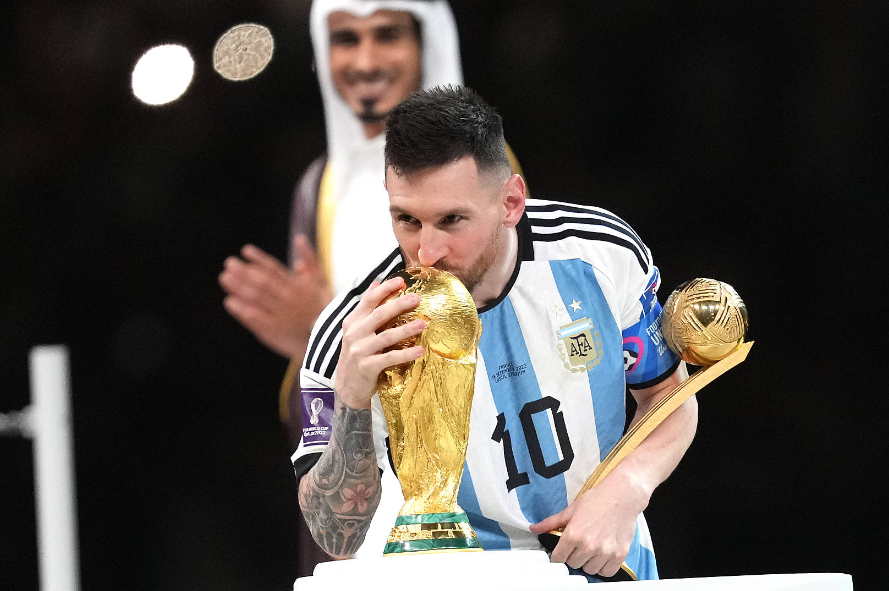
Amid a sea of blue and white stripes at Doha's Lusel Stadium in Qatar, a small bearded player holds up the World Cup. His face is full of joy. He is Messi. Argentina won the 2022 World Cup in Qatar by beating France 7-5 in a penalty shootout. Messi, who has played in the World Cup five times, finally won the coveted championship and got the last piece of the jigsaw puzzle of his career.
Messi, 35, could not have made a more perfect ending to his final World Cup campaign. However, looking back at Messi's journey in the national team, it is not all smooth sailing.
17 years of challenge to realize the dream of Qatar. In August 2005, Messi made his debut for the national team. In the 17 years since, Messi and Argentina have failed to win a major international final, with the exception of leading the Argentine national team to a gold medal at the 2008 Beijing Olympics.
During this period, Messi participated in four Copa America with Argentina, getting three runners-up and a third place, but was never able to knock on the door of the championship. Messi himself also refused to accept the award after being elected the best player of the tournament in the 2015 Copa America, and withdrew from the national team after breaking down in 2016 to take responsibility for the loss.
Finally, in the 2021 Copa America, Messi led the "Pampas Eagles" to the end in his personal fifth Copa America tour, winning his first title in the Argentine national team.
Coincidentally, Qatar 2022 will also be Messi's fifth World Cup event. In 2006 experienced the first time to participate in the immature; The low point of one assist in five games in 2010; After missing the title in 2014 and falling out in 2018, Messi and Argentina won the championship and lifted the World Cup.Messi, who helped Argentina win the title for the third time in the team's history, followed in the footsteps of his predecessor Maradona. And his personal "last dance" in the World Cup, also dedicated to a nearly perfect performance.
In this World Cup, Messi scored 7 goals and sent 3 assists, making the number of personal World Cup goals to 21, becoming the World Cup first. With excellent personal performance eventually led the team to win the championship, Messi was also elected the best player of the World Cup and won the Golden Ball award.
In addition, after starting seven games in this World Cup, Messi has become the World Cup history leader with 26 World Cup games, breaking the 24-year-old world record held by Germany's Matthaus.
In the final, Messi scored two goals, and also scored the first goal in the penalty shootout, laying the groundwork for Argentina's victory while being named player of the match. "The debate about The GOAT (best player of all time) is over and the ultimate prize is now part of Messi's collection, the full legacy of his career," FIFA said after the match.
A blessed football genius, a bumpy road to success
"Genius is one percent inspiration and ninety-nine percent perspiration." The words are appropriate for Messi.
Leo Messi was born on 24 June 1987 in Rosario, Santa Fe Province, Argentina.
A year ago, Maradona, hailed as a national hero, led Argentina to its second World Cup title, but Messi's football story is just beginning.
Family opened the world of football to Messi and helped him find his lifelong love. In 1991, at the age of four, Messi joined Grendori, an amateur football club coached by his father Jorge Messi.
Among his peers, Messi has always been the smallest player, but his talent still stands out. In the documentary Messi, Messi's childhood recalls: "He would play with the older kids and he bypassed all of them."
Messi made his debut in 1994 when he joined the junior team of Newell's Old Boys Football Club. The club has won the Argentine First Division title five times, and before Messi, the club was also the mother team of many Argentine football stars such as Pochettino and Batistuta.
The talented Messi is looking forward to a bright future, but fate has played a joke on him. In 1997, at the age of 10, Messi was diagnosed with a growth hormone deficiency. He needs constant injections to make sure his body continues to grow.
"I was really faced with the situation of saying goodbye to football, when my illness became a torture that made me extremely uncomfortable, and I often watched the normal children playing outside the pitch by myself. I wasn't happy, it was an exercise given to me by fate, and luckily I came through with my football." Messi said in his memory.
The Massey family, who were working solely at the time, had depleted their savings and could not afford to pay at least $1,000 a month for treatment. They went to Newell's Old Boys and River Plate club and other domestic clubs had no success, and the family had to travel far across Spain to find help for Messi.
As fate would have it, Messi's most cherished and sacred Barcelona club extended an olive branch to him. Resaic, the team's director at the time, spotted Messi's talent, but the club's executives were hesitant to sign him and pay for him.
In the end, Messi still waited for the napkin that changed his fate. During the meeting with Messi's father, Resaic signed the agreement with Messi on a napkin. Messi was able to enter La Masia's youth academy in 2000 and became a registered player with the Real Spanish Football Association in 2002.

